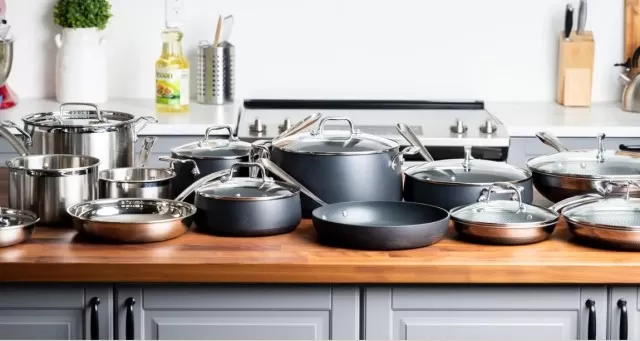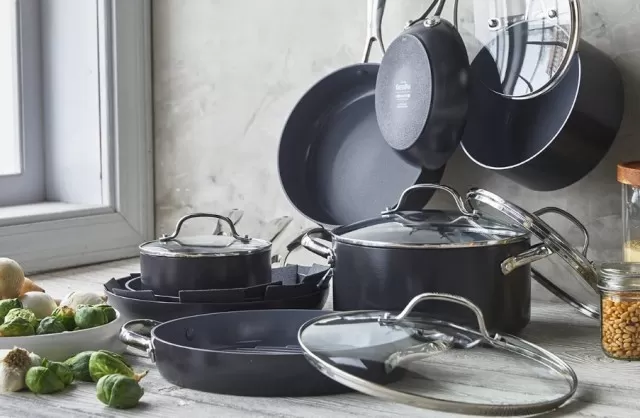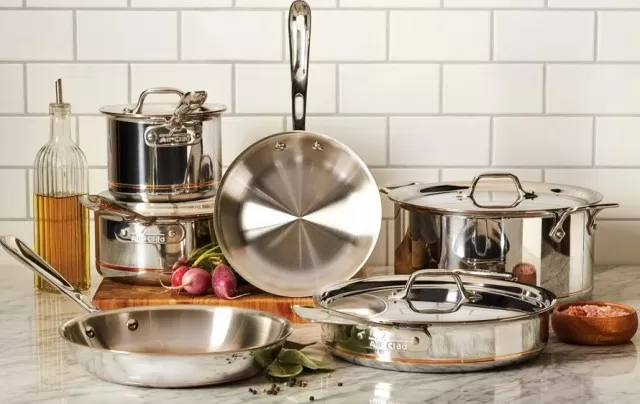Neglecting to wash cookware properly before initial use could potentially lead to discoloration or stains.
Is it Necessary to Clean Newly Purchased Cookware?

When it comes to whether or not you should wash brand-new cookware, the advice from Ben Chapman, Ph.D. , a food safety extension specialist and professor at UNC, indicates that the risk associated with not washing new dishes or cookware is relatively low.
However, there are some considerations to take into account.
According to Dr.Chapman, there is a minimal risk of not washing new cookware, but it’s worth noting that certain materials, such as plastic sheeting or dust from the warehouse, may be present on the cookware. While the likelihood of these materials being toxic is low, they can potentially impart unusual or undesirable flavors to your food, which is something best avoided.
Furthermore, it’s essential to consider the number of hands that may have come into contact with the cookware during the manufacturing process or while it was on display in stores.
Dr. Chapman emphasizes that when you purchase something from a store, it’s prudent to assume that many others have handled the same dishes or cookware.
Therefore, washing your new cookware serves as a precautionary measure to remove any potential germs or contaminants.
In Dr.Chapman’s words, “For something that’s exposed to the world, in my home, I would clean and sanitize it before using it for the first time. ” He also underscores that cleaning and sanitizing are two distinct but equally important steps in ensuring the cleanliness and safety of your new cookware.
By taking these measures, you can enjoy peace of mind when using your kitchen tools and utensils.
How to Properly Clean New Dishes:

There are various approaches to effectively sanitize your new dishes, and it’s essential to choose the method that suits your preferences and the type of dishware you have.
To ensure proper cleanliness and food safety, follow these recommended steps:.
Bleach Spray and Soap: Dr.Chapman suggests using a straightforward bleach spray to eliminate any potential microbes on your new dishes. After applying the bleach spray, make sure to thoroughly clean the dishes with soap and water.
It’s crucial to ensure that there is no residual bleach residue, as consuming it is not advisable.
Dishwasher Cycle: Another method is to sanitize your new dishes and then run them through a regular dishwasher cycle.
This approach is especially useful if you’ve purchased a brand-new set of dishes and need to wash a significant number of items. The high-temperature wash and detergent used in dishwashers effectively clean and sanitize the dishes.
For Cookware: When it comes to new cookware, Royal Prestige offers specific guidance:.
“Before using your new cookware for the first time, be sure to wash it thoroughly,” advises the retailer.
They recommend adding 1/4 cup of vinegar to warm Soapy Water and using a sponge or dishcloth to wash each piece. This step is crucial to remove any residual manufacturing oils or polishing compounds that might still be present in the cookware.
Neglecting to wash cookware properly before initial use could potentially lead to discoloration or stains.
Special Care for Nonstick Pans:

It’s important to note that different types of cookware may require varying levels of care.
For instance, nonstick pans have their own set of care instructions. Some nonstick pans are not suitable for dishwashers and require hand-washing, while others can safely go in the dishwasher.
Always double-check the care instructions provided with your purchase to ensure you are following the recommended cleaning method.
Additionally, it’s a good practice to season your nonstick pan before its first use.
After cleaning it, lightly apply cooking oil (vegetable oil works well) to the pan’s surface. Heat the pan on the stove for two to three minutes over medium heat.
Once it cools, wipe off any excess oil, and your nonstick pan is ready for use. Proper care and seasoning can help maintain the nonstick surface and enhance its performance.
*The information is for reference only.